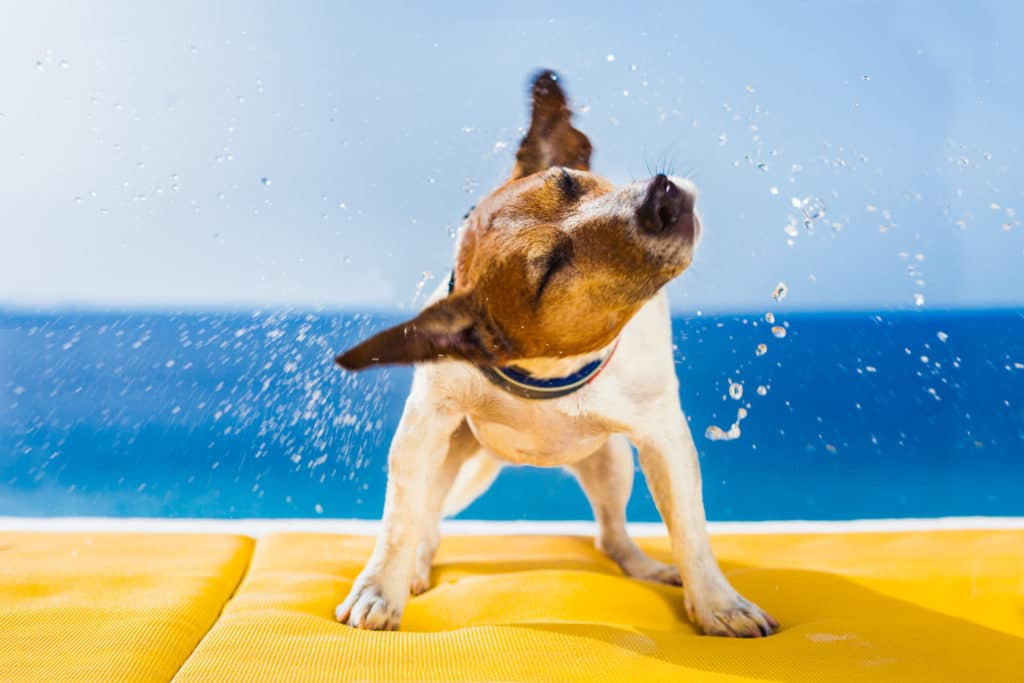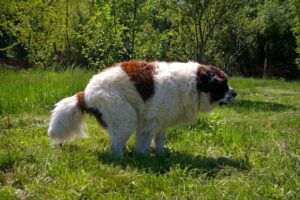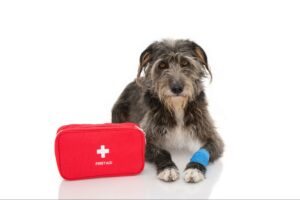Every dog owner has experienced their pooch shaking off water after a bath or a walk in the rain. But what about other instances of dog shivering, shaking, or trembling?
A dog tremble, shake, or shiver can mean all kinds of different things — some good and some bad. Let’s break down each of them.
Happy or Positive Shakes and Shivers
Drying Off
We already mentioned this one, but it’s worth noting that there is absolutely nothing wrong with your dog shaking off excess water after getting wet — other than getting your house and you wet, of course! In fact, this reflex actually helps dogs to prevent hypothermia because all of that water can make them feel really cold if it just hangs around in their fur. Dogs and other animals have perfected their shaking abilities to the point where they can remove 70 percent of the water from their fur this way.
Solution: Other than keeping the spray of water away from things you don’t want to get wet, there’s nothing to fix here!
Excitement
Have you ever experienced a dog tremble or shiver in the middle of a game of fetch or while offering affection? It may look odd, but it’s nothing to worry about. Shaking when excited is completely normal and healthy for dogs — it just a way of lowering that excess energy.
Solution: There’s not necessarily a solution required, but sometimes physical displays like this can increase a dog’s energy instead, and cause her to get too hyper. If this happens to your pooch, work on ignoring hyperactivity and rewarding calm behavior.
Intelligence
Many pet owners offer love and affection when they notice their dog is shaking or shivering. Some dogs pick up on this and will start to shiver or tremble when they want your attention. Pretty smart pup, huh?
Solution: While this may be a good indicator of your dog’s intelligence, it’s not really a great behavior to reinforce. Curb it by providing affection only when your pooch is calm and submissive, and ignoring them when they shake for attention. Eventually, they will get the message and stop.
Dog Shivering and Trembling to Look Out For
Cold Environment
You know how dogs shake off excess water to prevent hypothermia? Well, many dogs also shake when the weather cools down for the same reason we do — they’re cold. While this usually isn’t something to worry about, it can pose a big problem if your pup is out in cold or freezing conditions for an extended period.
Solution: Most dogs who are bothered by the cold will be sufficiently warmed with a simple dog coat or sweater. Also, remember to provide protection for their paws, such as booties.
Sickness or Pain
Often, dogs will shake or shiver if they are in pain or suffering from some kind of sickness — just like we might tremble due to a cold or fever. Canine illnesses associated with trembling include distemper, generalized tremor syndrome (GTS), kidney disease, Addison’s disease, poisoning, nausea, seizures, and inflammatory brain diseases.
Solution: If you suspect that your dog is sick or in pain, your first course of action should be to contact your vet.
Stress
Just like people, dogs can get stressed out and become anxious. Also just like people, there are many reasons why this may happen: riding in a car, beeping alarms, fireworks, trips to the vet, and so on. Worse, different stressors can develop over time based on negative experiences. When faced with these stressors, many dogs may tremble or shake, and some even engage in bad behaviors such as chewing on furniture.
Solution: Most dogs can alleviate their anxiety through training. If that doesn’t work, you may want to talk to your vet about medications that can help.
Old Age
As your dog gets older, you may notice that he develops tremors in his legs. While a certain amount of age-induced shaking is to be expected, don’t simply assume that everything is proceeding normally. Shaking in senior dogs can also be a sign of pain, particularly joint pain and discomfort.
Solution: Work with your vet to see if there are any treatments or therapies that may alleviate any pain or deterioration your dog is going through. Additionally, it’s important to remember that older dogs simply aren’t as physically able as younger dogs, and you should adjust your exercise routines accordingly.
The bottom line is not to ignore it when your dog shakes, shivers, or trembles. While the reason behind it may be completely benign, it’s important that you pay attention so you can make sure your pooch gets help if she needs it.
In what circumstances does your dog usually shake or shiver? Tell us in the comments.











